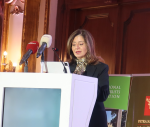You are here
Peace mission may get extension
Apr 01,2014 - Last updated at Apr 01,2014
Time is running out for US Secretary of State John Kerry who is mediating peace between Israelis and Palestinians.
Eight months have passed since he convinced the two sides to return to the negotiating table. The deadline for the conclusion of this round of talks is April 29, but there are few indications that things are going Kerry’s way.
In fact, the two sides appeared to be moving away from each other recently, as Israel backed down on its commitment to release the fourth batch of Palestinian prisoners while Palestinian President Mahmoud Abbas threatened to walk away from talks if Israel does not honour its word.
Kerry’s shuttle diplomacy resumed last week after a short hiatus following events in Ukraine and Russia’s annexation of Crimea. He met in Amman with King Abdullah and later with Abbas.
From Paris, he called Israeli Prime Minister Benjamin Netanyahu in an effort to convince him to deliver on his promise to release the final group of Palestinian prisoners. And by Monday evening he was back in the region to oversee delicate talks with the two sides.
Reports say Netanyahu wants something in return for setting free Palestinian prisoners: the release of imprisoned spy Jonathan Pollard. He also wants the Palestinians to commit to an extension to negotiations, in addition to guarantees that Abbas will not take his case to UN and other international organisations.
The Palestinians are clearly frustrated. Israel has accelerated its settlement activities in East Jerusalem and the West Bank while continuing to negotiate. Refusing to budge on settlements, it now insists that the Palestinians recognise Israel as a Jewish state, something Abbas refuses.
In the recent Arab summit in Kuwait, Arab leaders collectively rejected that demand. Netanyahu has made clear that failure to have Israel recognised as a Jewish state is a deal breaker.
But there are other deal breakers that Kerry has to confront.
Although no details have been made public about his proposed framework of principles, which should pave the way to a final deal within a year, what has emerged from Palestinian and Israeli officials does not bode well for the Palestinian side.
Israel rejects granting the right of return to Palestinian refugees, refuses to negotiate East Jerusalem, is about to annex major settlements in the West Bank, demands to keep its troops permanently in the Jordan Valley and wants to have security guarantees from the future Palestinian state.
And even then Netanyahu will not commit to a final deal.
Abbas, on the other hand, will not accept to sign a deal that denies the Palestinians almost every “right” that contributes to a just resolution to decades of injustice suffered by his people.
He is reminded by his aides of the offer that was delivered to his predecessor, Yasser Arafat, at Camp David in 2000 and which the Palestinian leader could not accept.
Abbas himself refused to embrace another deal that was offered to him by former Israeli prime minister Ehud Olmert in 2008.
Failure by both sides to come to an understanding has delayed Kerry’s framework agreement. It is unlikely that he will be able to bring the two parties closer in the remaining time.
His current efforts will focus on convincing them to negotiate beyond the April 29 deadline.
For Israel, the extension is important for several reasons: it relieves Netanyahu from making any commitments at present, allowing his government to push on with plans to Judaise East Jerusalem further and at a quicker pace.
It also portrays Israel as a peace negotiator while putting the blame for any interruption on the Palestinians. Most importantly, it denies the Palestinian side the opportunity to gain legitimacy and recognition by international organisations, following Palestine’s admittance to the UN as a non-member state.
Abbas knows that US pressure will fall on him to accept an extension. His threat to go to the UN and other international organisations will cost his flailing Palestinian Authority dearly in terms of financial and political support. He risks becoming irrelevant if he challenges the US and Israel.
On the other hand, he cannot accept unfair Israeli conditions for a peace accord. His situation has become worse as his Fateh movement is now suffering from internal divisions.
His foe, Mohammad Dahlan, has gained the support of some Gulf countries and was recently welcomed in Egypt. Relations with Hamas have not improved and there is an Israeli veto against Palestinian reconciliation.
Ironically, and for different reasons, neither the Israelis nor the Palestinians see any value in reaching a deal now. But Kerry will push on with his initiative.
It is likely that Abbas will cave in and accept an extension for a small price, such as the release of additional Palestinian prisoners. He will look for a face-saving gesture and find a way to convince his supporters of the necessity of staying engaged in peace talks.
Sadly, this will be beneficial to Israel but will come at great expense to the Palestinians.
The writer is a journalist and political commentator based in Amman.












